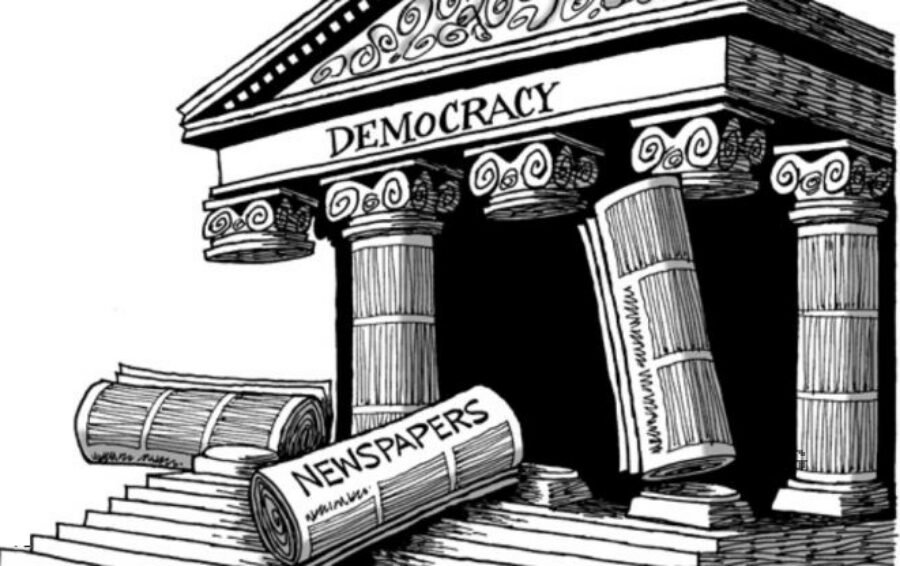The term Fourth Estate refers to the Mass Media (MME). Initially it referred to the press, as it was the only media, before the development of the others (radio, TV, Internet).
The title of the Fourth Power has been established on the basis of the three powers we know: legislative, executive and judicial.
Somewhere here, then, the indistinguishable boundaries begin. Of course depending on the approach, the usefulness, or the dysfunction of the Fourth Power changes.

First approach
In the first and best approach, the media, after their liberation and independence from the state, contributed to its democratization:
- Δρουν ελεγκτικά απέναντι στο κράτος και παρακολουθούν την άσκηση των τριών εξουσιών, αποκαλύπτοντας τυχόν καταχρήσεις και εξασφαλίζοντας τη διαφάνεια, επιτελούν δηλαδή το ρόλο "φύλακα".
- They provide information on public issues to more and more groups, thus enlarging the political nation. As its size increases, so does its power, that is, its democracy.
- They convey the voice of the people, unifying all the different opinions that come from society and are worth hearing through the common prism to which they converge. In other words, they transmit public unanimity as it emerges through social dialogue.
Έτσι λειτουργούν σαν ένας επικοινωνιακός δίαυλος μεταξύ των κυβερνώντων και του λαού αλλά και ανάμεσα στις ετερόκλητες ομάδες του τελευταίου. Τα ΜΜΕ ενισχύουν το λαό: απ' τη μια ασκώντας κριτική στην πολιτική εξουσία και ελέγχοντάς την εξονυχιστικά κι απ' την άλλη μεταφέροντας το λαϊκό παλμό κι αντιπροσωπεύοντας την κοινή γνώμη στην κυβέρνηση. Αυτή η μετατόπιση εξουσίας απ΄ το κράτος προς το λαό με τη μεσολάβηση των ΜΜΕ, δίνει στα τελευταία τον τίτλο της Τέταρτης Εξουσίας. Τέταρτη Εξουσία, με την έννοια ότι ενσαρκώνουν τη "φωνή του λαού στους διαδρόμους της εξουσίας".
Second Approach
The other view opposes the first, and this is because thefaceShe and the representatives of the political economy of the media deny the functioning of the media as a Fourth Estate. They believe that the media have never managed to free themselves from the power structure and become fully independent, but neither have they become the voice of society.
- Τα ΜΜΕ δεν είναι ουδέτερα εφόσον είναι μεγάλες επιχειρήσεις ή εξαρτώνται από επιχειρήσεις, υπόκεινται σε κάποιο ιδιοκτησιακό καθεστώς και μάλιστα πολλές φορές ολιγοπωλιακό, ακόμη και μονοπωλιακό. Αυτό εξ' ορισμού, τα κάνει φορείς ιδιωτικών (κυρίως) συμφερόντων και αλλοιώνει το ρόλο του "φύλακα" αφού είναι μέρος αυτού που πρέπει να ελέγχουν.(π.χ. η General Electric, η Toshiba και η Fiat είναι μερικές από τις επιχειρήσεις που έχουν εξαγοράσει ΜΜΕ)
- The media, their owners and the journalists who work for them are part of the establishment. We can not forget their political commitments, the power exercised by their leadership groups, the relationship they seek to have with the government and the legislation to which they are subject. All this limits independent journalism to the limits of what is permissible and possible as defined by a capitalist system.
- Censorship may no longer be carried out by the state but it is just as harsh. This time it comes from the free market system and is in the form of dependence on advertising, the high market costs of most SMEs, the constant growth of oligopolies. So not all voices are heard equal, but those that have the chapter.
These are some of them points which show that the media rather manipulate and produce reality than act as a mirror of it. Thus, there is probably no Fourth Estate, as a power of the people through the media as the first view claims, but rather the power of the media, according to the economic and cultural elite in power, over the people.
Mixed grill

What will happen now if we confuse the two approaches above?
For example, what would a hidden Fourth power that strengthens the state machine look like to you?
We are talking about an illusion of the first approach, where under the banner of justice, autonomy and the well-being of the People, governments can and do exist, simply because they do not convey information.
Why am I writing all of the above? So we are in 2022 and I think we are addressing an audience that can think and judge out of the boundaries, or at least outside the established limits.
Το ξεροψήσιμο των Τηλεοπτικών καναλιών και η χρήση μιας πολιτικής (όχι πολίτικης) σάλτσας (ανεξαρτήτου χρώματος), μπορεί να δημιουργούν εξαιρετικά πιάτα, αλλά απέχουν πολύ από την πραγματικότητα. Ας μην ξεχνάμε την αξία της ωμής αλήθειας....






In the 80's we said an expression: What is happening now in the US, we will have it, we will face it in 20 years.
Decades passed, in general the media were of the media (media) until we reached the frustrating day of our "inclusion" in the deadly Memoranda where, among other things, the media speakers began to stare at the camera (and they seem to be absurd…) even if one is 40 cm away from his interlocutor.
The reason this was done (under the mandates and guidance of the, institutions, as he called them "I do not have a single badge and you made me prime minister") was, every speaker, commentator on an issue, to pierce, submit, direct and command the mind of the amoeba. The viewer who has IQ of radish, but also more. Maybe a lot of "smart".
This certainly did not happen by itself. At the same time, the great thinkers magically disappeared from society (because the media does not invite them to speak), the great lyricists, poets, writers disappeared. In other words, those who could act as an antidote to the stupidity imposed by the media through its anchormans were lost.
And now let's go to the main course. Did the media speakers do it themselves? Of course not. They did it on instructions, orders but also for a rough fee from the owners of the media.
And rightly so, some thoughts arise here: who are these owners, my child? Who owns the media?
Let's talk about Greece (ATTENTION! I love my homeland Greece, but I hate "Greece", the colony of lenders and the home of idiots) where, owner of an oil company, who is also a shipowner, has two TV stations.
Another TV station owner has a fuel fleet
Another shipowner is preparing to enter the television landscape (while it already has newspapers and a radio station) from the side (an Internet television station platform). (*)
I could quote such a lot. Especially if I was thinking of referring to the USA as well.
So, what kind of pluralism and what kind of credibility, neutrality are we talking about when ALL of them are government financiers?
For what unbound "4th power" can someone propose to me?
For what real information can someone tell me when ALL THESE (those of the 4th power) owe what we all owe to the Greek State after 100 generations?
I will not record more, I will not steal more time from any readers, I will not take advantage of iguru tolerance. But all I will ask of each one is TO FINALLY USE THAT "WEIGHT" OF ~ 1.200 grams that he has inside his skull, his mind and to filter what he hears, reads and is projected by the (media (mass media) .
And once he does, I guess he'll rank them where they need to be. To nowhere. It will devalue them.
s.GTHK: if I wrote in my blog I would put the names, but here I will not do it so as not to put in a difficult position people I appreciate. I declare that I have unlimited respect for Politics, for Information, for my Fellow Man, but not at all for the swindlers that the system of the feudal elitist dictatorship creates or promotes. Worldwide.